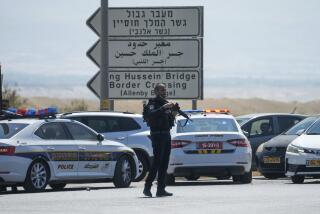Israel, Jordan Open Road Link : Mideast: Rabin, Christopher and crown prince attend ceremony. Crossing will be limited to foreigners initially, but move deepens goodwill between former enemies.
- Share via
AQABA, Jordan — Israel and Jordan opened a new border crossing Monday through a desolate desert field that just days ago bristled with deadly land mines--a move that accelerated good feeling two weeks after the former enemies ended almost half a century of hostility.
“We have waited 46 years (for peace with Jordan). . . . We cannot wait even one day more,” Israeli Prime Minister Yitzhak Rabin said in an emotional ceremony during which grizzled veterans of Middle East warfare exchanged handshakes and gifts and King Hussein’s brother capped his speech by quoting from the Old Testament in Hebrew.
Rabin, Jordanian Crown Prince Hassan and U.S. Secretary of State Warren Christopher presided over the opening of border terminals between the twin southern port cities of Aqaba, Jordan, and Eilat, Israel. Then they joined Hussein for a celebratory lunch and talks at the monarch’s vacation palace beside the Gulf of Aqaba.
For now, the border is open only to tourists and business people from other countries--Israelis and Jordanians are not allowed to cross. But officials and journalists from Israel were permitted to attend the ceremony and a subsequent news conference.
“It is a tonic to see that some seemingly insoluble problems have their solutions,” Christopher said at the news conference with Rabin and Hussein.
There was a plaintive tone to Christopher’s comment, coming as it did in the midst of his often-frustrating attempt to mediate the region’s last remaining intractable conflict, between Israel and Syria.
After the festive day in Aqaba, he flew to Jerusalem on Monday night to report to Rabin and Foreign Minister Shimon Peres on his five-hour meeting Sunday in Damascus with Syrian President Hafez Assad.
Christopher plans to return to Washington today but is expected to head back to the region by the middle of next month.
In an eloquent address during the border ceremony, Rabin said the hastily built customs sheds and other facilities straddling the frontier provide “the ideal backdrop for the new relationships being formed between Israel and Jordan.”
“We are sitting on an old minefield, which was cleared only three days ago,” he said. “This is a field in which death and destruction were sowed. . . . Three days ago, this was a wilderness--only sand and more sand. Today, this place teems with new life. Three weeks ago, the dream of peace was far away. Today, it is materializing--telephone lines, tourism. Soon it will seem as though this is the way it has always been.”
Direct phone service between the two countries began Sunday with a call between Hussein and Israeli President Ezer Weizman. On Monday, the Israeli and Jordanian chambers of commerce pledged cross-border cooperation in a call of their own.
For Israelis, the emotional high point of the ceremony was Hassan’s surprise use of Hebrew to quote the biblical prophet Hosea’s vision of “turning the valley of trouble into a gate of hope.”
Israeli television anchorman Ehud Yaari, who was broadcasting the ceremony live, commented “Beautiful, beautiful” when Hassan broke into Hebrew. Later, he told viewers: “The crown prince has surprised us. This was the first time we hear him speak in Hebrew. . . . No Arab leader that I can recall has done such a thing.”
The Aqaba-Eilat border crossing stands on a newly poured asphalt plaza with Israeli customs on one side and Jordanian customs on the other. Blacktop roads from the towns to the crossing were put in over the weekend, along with new road signs pointing toward Eilat and Aqaba.
For most of Israel’s existence as a modern state, the towns have faced each other across a blue expanse of water. It is called the Gulf of Aqaba in Jordan and most of the rest of the world but in Israel is referred to as the Gulf of Eilat.
Swimmers and wind-surfers were kept on their own side of the border by gunboats stationed just off the beach.
Christopher described the area as “a place of longing, where Israelis and Jordanians could stand on the beaches of Eilat and Aqaba and see each other but not know each other.”
Asked by an Israeli journalist when Jordan will admit Israeli tourists, Hussein said, “I hope before long.” But he declined to say how long.
Later, Hussein took Rabin and Christopher on a brief cruise on the royal yacht, heading immediately into Israeli waters. A flotilla of small Israeli boats, waving Israeli and Jordanian flags, saluted the leaders.
The monarch, whose 41 years on the throne have all been dominated by Jordanian-Israeli animosity, said the normalizing relations between the countries provide “the sort of peace that I have never experienced over the very many years.”
More tangible payoffs for Jordan also came quickly.
Christopher said legislation forgiving Jordan’s $700-million debt to the United States “is proceeding through our Congress at an unusual pace.” And President Clinton wrote to the heads of the governments of Switzerland, Germany, Belgium, Denmark, Spain, Finland, Canada, France, Italy, Sweden, Austria and Japan urging them to give debt relief to the Hashemite kingdom. Clinton also thanked Britain for debt relief already undertaken.
“It is essential that the people of Jordan feel the benefits of peace in tangible ways,” the President wrote. “Jordan’s debt . . . is a major impediment to economic growth.”
Meanwhile, the slow, indirect negotiations continued between Israel and Syria. American, Syrian and Israeli officials all said Christopher’s Sunday meeting with Assad “laid the base for future progress,” using virtually identical language.
But Peres, who hitched a ride from Aqaba to Israel aboard Christopher’s U.S. Air Force transport, told reporters on the plane that he is convinced Assad wants peace, although it may take a long time to hammer out details. The Israeli foreign minister also said Syria appears to have persuaded Hezbollah militias in southern Lebanon to stop attacking civilian targets in Israel, ending a week of border skirmishes.
“I think it is an important gesture for continuing the peace negotiations,” Peres said. He said Christopher relayed Israel’s request for Syrian help in reining in Hezbollah and that Assad apparently complied, probably more to please the Americans than to help the Israelis.
Times staff writer Mary Curtius contributed to this report.
Opening the Border
Israel and Jordan on Monday opened the first road link between the two once-warring countries, connecting the resorts of Eilat and Aqaba. The border opening is one byproduct of the war-no-more agreement Israeli Prime Minister Yitzhak Rabin and King Hussein signed two weeks ago.
Resolved
* A “state of belligerency” has ended.
* The nations will cooperate on trade, banking and finance.
* Police from both countries will work against crime, especially drug smuggling.
Issues Outstanding
* A disputed borderline
* Water rights
The Players
KING HUSSEIN: The Jordanian leader, 58, ascended to the throne in 1953. Opposed the 1979 Camp David peace treaty between Egypt and Israel but later supported U.S. efforts to foster Arab-Israeli peace.
YITZHAK RABIN: The prime minister, 72, was once a Jewish underground leader and has been involved in Israeli politics since the nation was established in 1948. Military commander in the 1967 Mideast War. Won office after replacing Shimon Peres as Labor Party leader in 1992.
More to Read
Sign up for Essential California
The most important California stories and recommendations in your inbox every morning.
You may occasionally receive promotional content from the Los Angeles Times.










